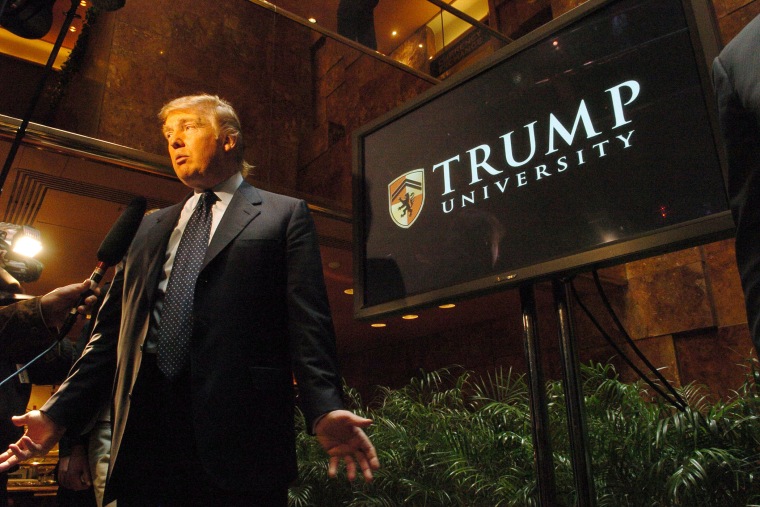About a year ago, a federal judge approved a settlement in the Trump University fraud case, requiring Donald Trump to pay $25 million to his former "students." There was, however, a small catch.
One of the plaintiffs wanted to opt out of the settlement and pursue a separate case against the president. Today, as Politico reported, that effort failed.
A federal appeals court has upheld the $25 million settlement President Donald Trump agreed to in a bid to resolve long running lawsuits claiming fraud in his Trump University real estate seminar venture.The 9th Circuit U.S. Court of Appeals rejected a challenge brought by Florida bankruptcy lawyer Sherri Simpson, who said she wanted to take Trump to trial over the $19,000 she paid for classes and a mentorship program.Lawyers for Simpson said notices sent to thousands of Trump University participants earlier in the litigation promised the right to opt out of the class-action suits immediately or after any settlement was proposed, but the three-judge appeals court panel disagreed.
New York Attorney General Eric Schneiderman, who brought the fraud case against Trump U, issued a statement after today's news from the 9th Circuit.
After keeping a close eye on this case for a long while, I think it's a shame to see the case end -- because I've long believed this is one of the underappreciated controversies of Trump's recent career.
Indeed, as regular readers may recall, the upheld settlement agreement wasn't supposed to happen at all -- according to the president.
During the 2016 presidential race, Trump boasted during a debate, “This is a case I could have settled very easily, but I don’t settle cases very easily when I’m right.” After boasting that the Better Business Bureau gave Trump University an “A” rating – a claim that turned out to be a brazen lie – Trump added, “Again, I don’t settle cases. I don’t do it because that’s why I don’t get sued very often, because I don’t settle, unlike a lot of other people.” (The assertion that he doesn’t “get sued very often” also turned out to be a demonstrable falsehood.)
After the election Trump settled the case he said he’d never settle -- shortly before he was supposed to take the stand in his own fraud case.
And what a case it was. The Washington Post reported in 2015 about students sometimes “max[ing] out their credit cards to pay tens of thousands of dollars for insider knowledge they believed could make them wealthy.”
Never licensed as a school, Trump University was in reality a series of real estate workshops in hotel ballrooms around the country, not unlike many other for-profit self-help or motivational seminars. Though short-lived, it remains a thorn in Trump’s side nearly five years after its operations ceased: In three pending lawsuits, including one in which the New York attorney general is seeking $40 million in restitution, former students allege that the enterprise bilked them out of their money with misleading advertisements.Instead of a fast route to easy money, these Trump University students say they found generic seminars led by salesmen who pressured them to invest more cash in additional courses. The students say they didn’t learn Trump’s secrets and never received the one-on-one guidance they expected.
“He’s earned more in a day than most people do in a lifetime,” a 2009 ad, featuring Trump’s photograph, said. “He’s living a life many men and women only dream about. And now he’s ready to share – with Americans like you – the Trump process for investing in today’s once-in-a-lifetime real estate market.”
Trump’s attorneys insisted that aspiring investors learned valuable lessons with which most students were satisfied. But the Post’s article also highlighted a Texas man, Louie Liu, who said he paid “$1,495 for a three-day seminar, then felt lured into paying $24,995 for more classes, an online training program and a three-day in-person mentorship.”
He now believes that the Trump University program was a “scam.”
Another man, Bob Guillo, paid nearly $35,000 for the “Trump Gold Elite package,” which amounted to very little. “I really felt stupid that I was scammed by Trump,” Guillo said.
In fact, what I've long found important about this story are the parallels between the "school" and Trump's rise to political power: a group of Americans, looking for easy solutions and wowed by a celebrity making too-good-to-be-true promises, put their faith in an accused scam artist, only to learn that Donald Trump had no intention of delivering on outlandish pledges that never really made any sense.
Rank-and-file voters, however, do not have the option of filing a class-action lawsuit.
